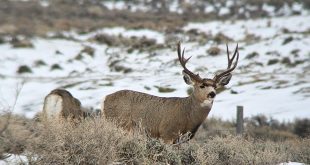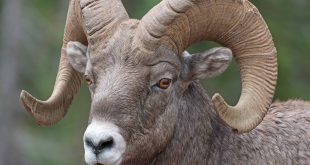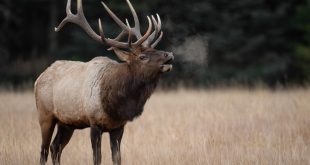Grizzlies Expanding At A Fast Rate
By Dan Pickar
Grizzly bears are expanding their home range and the first documented sighting in Montana’s Pryor Mountains just happened recently. Much like wolves, when grizzly bears reach and exceed their carry capacity for an area they search for new territory to inhabit that has less competition for food with their own species. That is the reason why there are so many “problem bears” over the last two decades and bears end up in town, in farm lands and even places like Lewistown, Montana and the Missouri River Breaks.
It has been reported that grizzly bears have been spotted in the Pryor Mountains in the past but this is the first confirmed case in this particular area. For a grizzly bear to reach this area it would have to cross 35+ miles of sagebrush, farmland, and two highways to make it there. This brings us to a recent article reported on by Wyofile. Biologists have gotten together and have talked about the desire for a contiguous population of Grizzly bears from Alaska to Yellowstone all in the name of genetic diversity. They are talking about these specific types of bears that wander great distances to find new territory and bears that are genetically different. Biologists claim that it is a sort of connectivity which will ensure the survival of the species in the very distant future. . . they think.
What does this mean for the public land user? Well, it’s bad news for recreationists in grizzly country because this means that population control and hunting in core grizzly bear areas will be even more of a pipe dream. Former USFWS Grizzly Bear Coordinator Chis Servheen said, “In my mind, hunting would put connectivity at grave risk.”
The area in play here is a 35 mile area from the Tobacco Root mountains west of Bozeman to the Elkhorn mountains near Helena. If a grizzly bear were to make this trek, this would technically connect the Northern Continental Divide and Yellowstone ecosystem grizzly bear population. While there has been no concrete evidence of this being done I can assure you it’s already happened.
Ultimately, what it means for the public land user in grizzly bear country is that our elk and moose populations will continue to decline, hunting opportunity will continue to decline, bear attacks will continue at an alarming rate, grizzly bears will continue to show up in town, and there will be no hunting season any time soon.
 Eastmans' Official Blog | Mule Deer, Antelope, Elk Hunting and Bowhunting Magazine | Eastmans' Hunting Journals
Eastmans' Official Blog | Mule Deer, Antelope, Elk Hunting and Bowhunting Magazine | Eastmans' Hunting Journals




